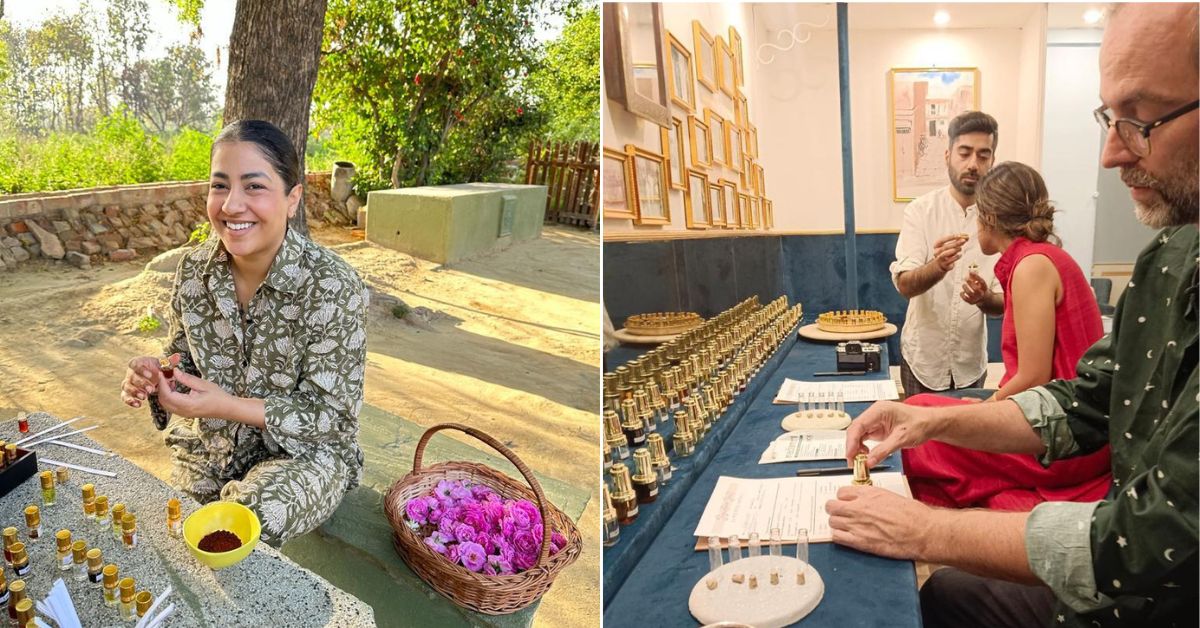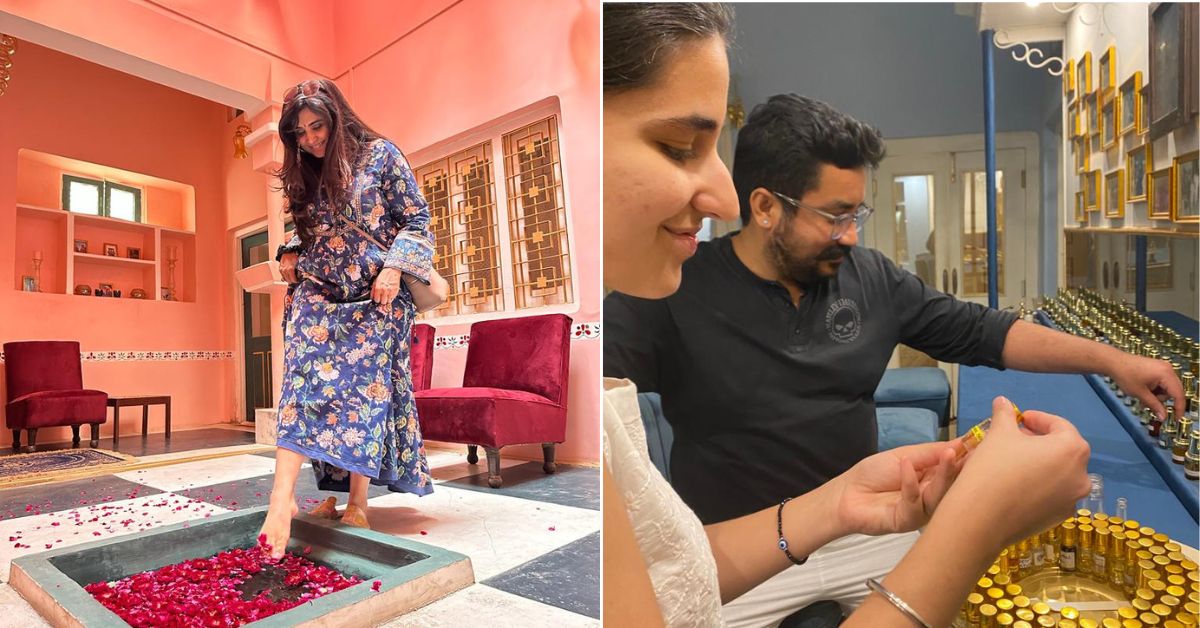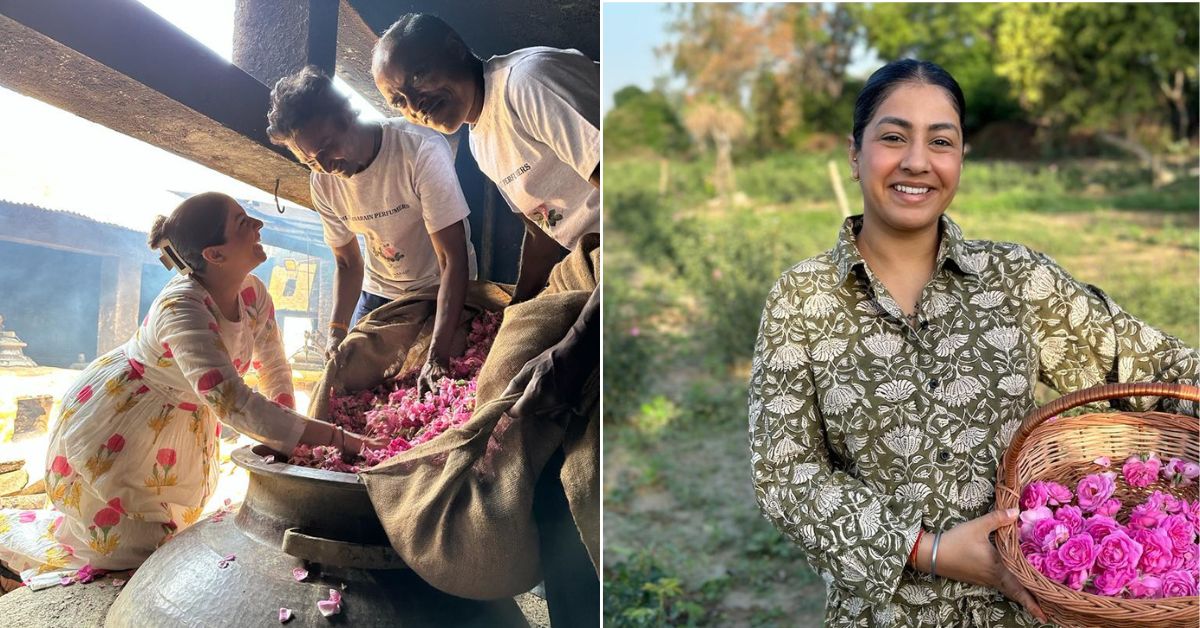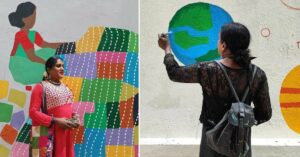How Are Perfumes Made in Kannauj? A Chef Keeps the Ancient Craft Alive in His 120-YO Home
Eighth-generation perfumer Pranav Kapoor turned his ancestral home into an experiential retreat where he promotes his family and Kannauj’s ancient art of perfume making, where visitors can make their own perfumes and keep a dwindling professional alive.

To me Kannauj — only a two or three hour drive away from my city, Agra — at first appears as a typical, dusty town in North India, marked by narrow streets, vibrant markets, and thronging crowds. But the scent of a glorious past captivates the historian in me while I stroll through those lanes and take in the sharp scents of roses, sandalwood, and jasmine.
This historical wonder was once the stronghold of Emperor Harsha, who made it his empire’s capital. As I traverse its expanse, I note how, while its glistening charm may have gotten rusty over the years, it is unperturbed in many ways — most popularly for its distinct culture of perfumery or attar-making.
A 200-year-old history
Though modern-perfume making has posed a threat to this traditional industry, several Kannaujwalas (residents of Kannauj) strive to keep the centuries-old profession alive. Among them is Pranav Kapoor, an eighth generation perfumer who turned his 120-year-old haveli (mansion) into a peculiar retreat as a way to keep his family’s work alive.
“Eight generations of my family have been perfumers, and I spent my childhood around the factory,” the 35-year-old notes. “One of my fondest memories is when my grandfather would ask me to identify fragrances.”
At the haveli, through which he operates his venture Perfume Tourism, Pranav offers guests a peek into his family’s 200-year-old history of perfume making, their recipes and combinations throughout the year, and how the painstaking process takes place.

The number of distillers in Kannauj has been on a constant decline, notes Live History India, and even measures like the provision of a Geographical Indication tag in 2014 have not helped the numbers from dwindling.
Pranav’s Perfume Tourism not only comes as a much needed recourse, but also marries a detailed insight into the centuries-old industry with his love for cooking and elaborate meals.
‘Wanted to do this for my city’
Pranav says that he originally pursued a culinary course in 2010. “Since flavour and fragrance go hand in hand, I went to Delhi and did a culinary course to become a chef. Cooking and perfumery were my passion, and I wanted to find a way to merge these two,” he adds.
In 2017, while on a vacation to Jaisalmer, he stayed at a cosy homestay that first inspired him to unite these two passions.
“The place had been converted into a hotel, which gave me the idea to convert my 120-year-old haveli into something similar. I was quite shocked that no one in the city had thought of it before. It only made sense for me to go back and do this for my city,” he says.
“It took me nearly six years to work out a plan of action,” he adds, noting that COVID put a spanner in the works. “But in 2022, I decided to take the plunge.”
An aromatic experience
In 2022, Pranav started to refurbish his ancestral haveli to make it a delightful stay for the guests. “I worked on the website of the business and also planned a full seven-course menu that revolves around the festivals that we host,” he says.
He continues, “In the haveli, we have a courtyard, a fragrance gallery, and a perfume bar where people can come and make their own perfumes too.”
In March 2023, Pranav hosted his first group of guests to celebrate the ‘rose festival’.
Explaining the itinerary, he says, “We break down our festivals into seasons, because every flower has a different flowering season. For example, February to March is the ‘rose season’, so we had a rose festival. Everything was centred around roses, including the food.”

“The guests are taken to the rose field where they pluck the flowers for the perfumes. They are then taken to the distillery where they can witness the whole process of making scents. Then, we take them to the perfume bar where they can make their own perfumes with my help,” he adds.
Perfume Tourism also serves as a seven-course meal centred around the flower in question. So far, they hosted more than 40 guests and are currently running a ‘jasmine festival’.
“Since jasmine flowers need to be plucked at night, the itinerary is modified accordingly. With the temperatures soaring, this has come to us as an advantage as it is cooler during the nights,” he says.
“Aside from the dining and perfume experience, we also give them a quick history of Kannauj and the distillery, so that they understand the essence of the city. The guests then enjoy the haveli that we have created for them and rejuvenate,” he explains.
They have hosted people from all over the world including France and Australia as well as from Indian cities like Coimbatore, Delhi, Bengaluru, and Mumbai.
Shreeparna Khaitan, who visited the rose festival says, “It was quite an exciting experience. We were given a short history of the place, and then we plucked flowers and saw how perfumes are actually made. We were also able to make our own perfumes. The most interesting part of the whole itinerary was the meal that was planned. It was around roses, so every meal has some component of rose in it. I got to know about the Indian essential oils that are used in perfumes and the rich history behind them.”
Pranav notes, “With this business, my idea is to promote every aspect of my hometown and truly make Kannauj the perfume capital. People tend to look towards brands or countries like France for perfumes, forgetting that many of those import scents from Kannauj. I want to ask them to look inwards and experience the rich history with the best smells there are,” he says.
“I believe that when we start a business in a small town, it gives rise to more work opportunities and promotes more businesses within the city. I hope that with this endeavour more and more people will work on similar ideas and bring back the city to its former glory,” adds Pranav. If you found our stories insightful, informative, or even just enjoyable, we invite you to consider making a voluntary payment to support the work we do at The Better India. Your contribution helps us continue producing quality content that educates, inspires, and drives positive change. Choose one of the payment options below for your contribution- By paying for the stories you value, you directly contribute to sustaining our efforts focused on making a difference in the world. Together, let’s ensure that impactful stories continue to be told and shared, enriching lives and communities alike. Thank you for your support. Here are some frequently asked questions you might find helpful to know why you are contributing?

You can visit Perfume Tourism here.
Edited by Divya Sethu
This story made me
-
97
-
121
-
89
-
167













